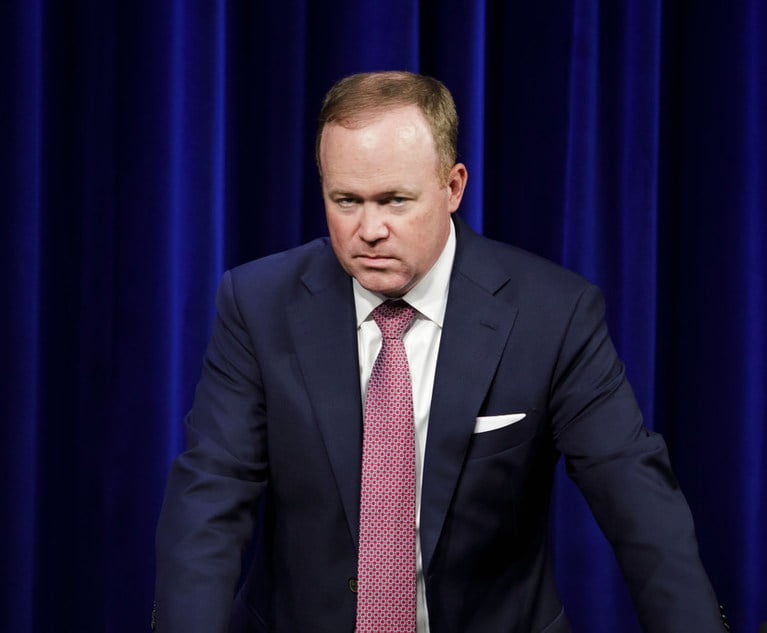Appellate Court Scolds Manatt for Strategic Delay in Anti-SLAPP Appeal
The First District Court of Appeal said Manatt, Phelps & Phillips and client Dignity Health sought “to extend SLAPP where it has never gone before.”
January 10, 2018 at 04:33 PM
3 minute read

A California appellate court has called out lawyers from Manatt, Phelps & Phillips and their client Dignity Health for using the automatic right to appeal decisions denying motions under the state's anti-SLAPP law to bog down a lawsuit brought by a group of physicians.
In a 23-page published opinion issued Tuesday, the First District Court of Appeal said Manatt and Dignity deserved criticism for seeking “to extend SLAPP where it has never gone before,” delaying the lawsuit for 22 months, and burning “untold attorneys fees.”
“A well-known saying, generally attributable to William Gladstone, is that 'Justice delayed is justice denied,'” wrote Justice James Richman, quoting from the court's 2011 decision in Grewal v. Jammu. “A lesser known saying, known to be attributable to prominent defense lawyers from major law firms, is that 'Justice delayed is justice.'”
The appellate court, however, stopped short of issuing any formal or monetary sanctions.
In the underlying lawsuit, Central Valley Hospitalists, a group of independent physicians who contract to provide services at a Dignity Health hospital in Stockton, sued the company in late 2015. CVH accused Dignity of inducing staff members to join one of Dignity's partners, harassing CVH physicians to the point they quit, refusing to provide necessary paperwork to physicians who wanted to join CVH, meddling in patient care, and inappropriately poaching CVH's primary care patients.
In CVH's complaint, the doctors' lawyers at the Arnold Law Firm in Sacramento stated its allegations weren't linked to “wrongs or facts arising from any peer review activities.” The California Supreme Court has found that the professional review of medical practitioners is the sort of official proceeding protected from a strategic lawsuit against public participation (SLAPP).
Despite CVH's representations, Dignity's lawyers at Manatt filed an anti-SLAPP motion claiming the actions underlying CVH's claims arose from “protected peer review activities.”
San Francisco Superior Court Judge Harold Kahn granted Dignity's demurrer of CVH's complaint, finding it didn't allege any facts to support its claims. But he denied Dignity's anti-SLAPP motion, finding the health care company couldn't point to any protected activity underlying the lawsuit.
“If there are no acts alleged, there can be no showing that alleged acts arise from protected activity,” Kahn wrote in his June 2016 order. Kahn said he could not rule based on what Dignity “believes [CVH's] claims are based on.”
Richman was joined in Tuesday's opinion upholding Kahn's anti-SLAPP ruling by First District Presiding Justice J. Anthony Kline and Justice Therese Stewart. The opinion quoted heavily from Kahn's earlier hearing on the matter and also borrowed from an earlier Fourth District opinion that found an earlier anti-SLAPP appeal “practically ha[d] the words 'brought for reasons of delay' virtually tattooed on its forehead.”
“Dignity Health has no forehead, and in any event Dignity Health does not appear to be the responsible party here,” wrote Richman before pointing the finger at the company's lawyers at Manatt.
Manatt partner Craig Rutenberg, whose name is mentioned multiple times in the opinion, didn't respond to an email seeking comment, nor did spokesmen for the firm and Dignity.
CVH's lawyer, Joshua Watson of the Arnold Law Firm, didn't respond to phone and email messages Wednesday.
This content has been archived. It is available through our partners, LexisNexis® and Bloomberg Law.
To view this content, please continue to their sites.
Not a Lexis Subscriber?
Subscribe Now
Not a Bloomberg Law Subscriber?
Subscribe Now
NOT FOR REPRINT
© 2025 ALM Global, LLC, All Rights Reserved. Request academic re-use from www.copyright.com. All other uses, submit a request to [email protected]. For more information visit Asset & Logo Licensing.
You Might Like
View All
How We Won: BraunHagey’s $56M Trademark Win Over Molson Coors Upheld by 9th Circuit
8 minute read
Insurers Dodge Sherwin-Williams' Claim for $102M Lead Paint Abatement Payment, State High Court Rules

What Does Ohio Supreme Court's Opioid Decision Mean for Public Nuisance Claims?
6 minute read
Judge's Civil Contempt Order for Zoom Recording Violation Must Include 'The Keys to the Cell,' State Appellate Court Says
4 minute readTrending Stories
- 1The Appropriate Exemption in Students for Fair Admissions v. President & Fellows of Harvard College
- 2DOJ, 10 State AGs File Amended Antitrust Complaint Against RealPage and Big Landlords
- 3New Partners at Cummings & Lockwood, Carmody Torrance Sandak & Hennessey
- 4'Extra Government'?: NY Top Court Eyes Ethics Commission's Constitutionality
- 5South Texas College of Law Houston Selects New Dean
Who Got The Work
Michael G. Bongiorno, Andrew Scott Dulberg and Elizabeth E. Driscoll from Wilmer Cutler Pickering Hale and Dorr have stepped in to represent Symbotic Inc., an A.I.-enabled technology platform that focuses on increasing supply chain efficiency, and other defendants in a pending shareholder derivative lawsuit. The case, filed Oct. 2 in Massachusetts District Court by the Brown Law Firm on behalf of Stephen Austen, accuses certain officers and directors of misleading investors in regard to Symbotic's potential for margin growth by failing to disclose that the company was not equipped to timely deploy its systems or manage expenses through project delays. The case, assigned to U.S. District Judge Nathaniel M. Gorton, is 1:24-cv-12522, Austen v. Cohen et al.
Who Got The Work
Edmund Polubinski and Marie Killmond of Davis Polk & Wardwell have entered appearances for data platform software development company MongoDB and other defendants in a pending shareholder derivative lawsuit. The action, filed Oct. 7 in New York Southern District Court by the Brown Law Firm, accuses the company's directors and/or officers of falsely expressing confidence in the company’s restructuring of its sales incentive plan and downplaying the severity of decreases in its upfront commitments. The case is 1:24-cv-07594, Roy v. Ittycheria et al.
Who Got The Work
Amy O. Bruchs and Kurt F. Ellison of Michael Best & Friedrich have entered appearances for Epic Systems Corp. in a pending employment discrimination lawsuit. The suit was filed Sept. 7 in Wisconsin Western District Court by Levine Eisberner LLC and Siri & Glimstad on behalf of a project manager who claims that he was wrongfully terminated after applying for a religious exemption to the defendant's COVID-19 vaccine mandate. The case, assigned to U.S. Magistrate Judge Anita Marie Boor, is 3:24-cv-00630, Secker, Nathan v. Epic Systems Corporation.
Who Got The Work
David X. Sullivan, Thomas J. Finn and Gregory A. Hall from McCarter & English have entered appearances for Sunrun Installation Services in a pending civil rights lawsuit. The complaint was filed Sept. 4 in Connecticut District Court by attorney Robert M. Berke on behalf of former employee George Edward Steins, who was arrested and charged with employing an unregistered home improvement salesperson. The complaint alleges that had Sunrun informed the Connecticut Department of Consumer Protection that the plaintiff's employment had ended in 2017 and that he no longer held Sunrun's home improvement contractor license, he would not have been hit with charges, which were dismissed in May 2024. The case, assigned to U.S. District Judge Jeffrey A. Meyer, is 3:24-cv-01423, Steins v. Sunrun, Inc. et al.
Who Got The Work
Greenberg Traurig shareholder Joshua L. Raskin has entered an appearance for boohoo.com UK Ltd. in a pending patent infringement lawsuit. The suit, filed Sept. 3 in Texas Eastern District Court by Rozier Hardt McDonough on behalf of Alto Dynamics, asserts five patents related to an online shopping platform. The case, assigned to U.S. District Judge Rodney Gilstrap, is 2:24-cv-00719, Alto Dynamics, LLC v. boohoo.com UK Limited.
Featured Firms
Law Offices of Gary Martin Hays & Associates, P.C.
(470) 294-1674
Law Offices of Mark E. Salomone
(857) 444-6468
Smith & Hassler
(713) 739-1250






